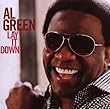 On the nine-song set of songs BLACKsummers’ Night by Maxwell, in the fast-paced song “Help Somebody,” Maxwell takes a hard look at self and the need to be a better, more generous and peaceful person; and in a lyric that moves into more speculative territory, he declares, “If you see the future, ask it if I’m there.” One imagines Maxwell will be part of the future as he has been part of the past. I hope that.
On the nine-song set of songs BLACKsummers’ Night by Maxwell, in the fast-paced song “Help Somebody,” Maxwell takes a hard look at self and the need to be a better, more generous and peaceful person; and in a lyric that moves into more speculative territory, he declares, “If you see the future, ask it if I’m there.” One imagines Maxwell will be part of the future as he has been part of the past. I hope that.
Heritage and Passion: Al Green’s Lay It Down
 It is not always easy to predict the artists who will be seen as important to an art form or culture: it takes years for us to live with art, years for the art to pass the rigors of personal mood and public questions, leaving some artists forgotten and others raised up. Whether singing of love and sex or spirituality, Al Green is important.
It is not always easy to predict the artists who will be seen as important to an art form or culture: it takes years for us to live with art, years for the art to pass the rigors of personal mood and public questions, leaving some artists forgotten and others raised up. Whether singing of love and sex or spirituality, Al Green is important.
A review of The Infinities by John Banville
 The gods envy the mortals because they exist. The beauty of humanity is in the everyday, limited action morality that involves eating, using the toilet, copulating (human to human, regardless of the guise), bleeding, feeling pain, giving birth, and above all, dying. This is the underlying celebration of the novel: the beauty of flawed humanity amidst the bodiless, bloodless gods.
The gods envy the mortals because they exist. The beauty of humanity is in the everyday, limited action morality that involves eating, using the toilet, copulating (human to human, regardless of the guise), bleeding, feeling pain, giving birth, and above all, dying. This is the underlying celebration of the novel: the beauty of flawed humanity amidst the bodiless, bloodless gods.
An interview with Kristin Bair O’Keeffe
 Kristin Bair O’Keeffe talks about her novel Thirsty, about her life in China and why she’s there, her publisher, on the craziness and creativity, of promoting a novel cross-country, on why she’s sending her resume to Cirque du Soleil, and lots more.
Kristin Bair O’Keeffe talks about her novel Thirsty, about her life in China and why she’s there, her publisher, on the craziness and creativity, of promoting a novel cross-country, on why she’s sending her resume to Cirque du Soleil, and lots more.
A review of Since the Accident by Jen Craig
 Since the Accident is a complex story masquerading as a ‘what happened then’ narrative, as it minutely examines the psychological fallout of being raised by a narcissistic mother. These women find it difficult to trust their own desires and perceptions, and are not allowed to truly be themselves, instead being undermined by the very people who are supposed to love them.
Since the Accident is a complex story masquerading as a ‘what happened then’ narrative, as it minutely examines the psychological fallout of being raised by a narcissistic mother. These women find it difficult to trust their own desires and perceptions, and are not allowed to truly be themselves, instead being undermined by the very people who are supposed to love them.
That Voice, Those Words: Bob Dylan, Time Out of Mind
 The rhythm is more prominent, more enthusiastic, with swing and twang, in Time Out of Mind’s “Dirt Road Blues,” than on “Love Sick”; and “Dirt Road Blues” is a song I can imagine being sung at a country fair. There is scene-setting and the comparison of different times—late night is mentioned, as is the changing pace of different days—in Dylan’s draggy voice, a voice that seems the representation of what he feels.
The rhythm is more prominent, more enthusiastic, with swing and twang, in Time Out of Mind’s “Dirt Road Blues,” than on “Love Sick”; and “Dirt Road Blues” is a song I can imagine being sung at a country fair. There is scene-setting and the comparison of different times—late night is mentioned, as is the changing pace of different days—in Dylan’s draggy voice, a voice that seems the representation of what he feels.
Soul Man, Sex Symbol: Marc Broussard, Keep Coming Back
 The creative work of Marc Broussard has drawn many comparisons to rhythm-and-blues music made from 1960s until now, but Broussard’s artistry seems influenced by that music, and in conversation with that music, rather than exploitative; and Broussard’s album Keep Coming Back has a richer sound than most of the other people, such as Duffy, Sharon Jones, Raphael Saadiq, Ryan Shaw, and Amy Winehouse, now mining the same vein.
The creative work of Marc Broussard has drawn many comparisons to rhythm-and-blues music made from 1960s until now, but Broussard’s artistry seems influenced by that music, and in conversation with that music, rather than exploitative; and Broussard’s album Keep Coming Back has a richer sound than most of the other people, such as Duffy, Sharon Jones, Raphael Saadiq, Ryan Shaw, and Amy Winehouse, now mining the same vein.
A review of The Element by Ken Robinson
 If this book makes even a small chip in the notion that a standardized test score is the best indicator of intelligence, it will have been worth Robinson and Aronica’s investment of time. For those of us reading it, it could do much more. It could open our eyes about the great diversity of unique capability that we all have and help us to think in much broader terms about ourselves, our children, our colleagues, and indeed our world.
If this book makes even a small chip in the notion that a standardized test score is the best indicator of intelligence, it will have been worth Robinson and Aronica’s investment of time. For those of us reading it, it could do much more. It could open our eyes about the great diversity of unique capability that we all have and help us to think in much broader terms about ourselves, our children, our colleagues, and indeed our world.
A review of The Five Greatest Warriors by Matthew Riley
 It may be one big rollercoaster ride of gunfights, races against time and intricate trap systems, but unlike Reilly’s previous novels, there are also several moments of reflection; most notably when everything has settled down after the hectic beginning of the novel and members of the team set out to research a mysterious inscription relating to ‘The Five Greatest Warriors’.
It may be one big rollercoaster ride of gunfights, races against time and intricate trap systems, but unlike Reilly’s previous novels, there are also several moments of reflection; most notably when everything has settled down after the hectic beginning of the novel and members of the team set out to research a mysterious inscription relating to ‘The Five Greatest Warriors’.
A review of One Foot Wrong by Sofie Laguna
 Despite the horror of Hester’s life – a horror that remains with the reader – there is also a deep sensual beauty. The reader is also left with Hester’s sense of joy and freedom in swimming in a river, noticing the life of the natural world: of insects; dappled light; or an “empty, blue sky” that never ends.
Despite the horror of Hester’s life – a horror that remains with the reader – there is also a deep sensual beauty. The reader is also left with Hester’s sense of joy and freedom in swimming in a river, noticing the life of the natural world: of insects; dappled light; or an “empty, blue sky” that never ends.